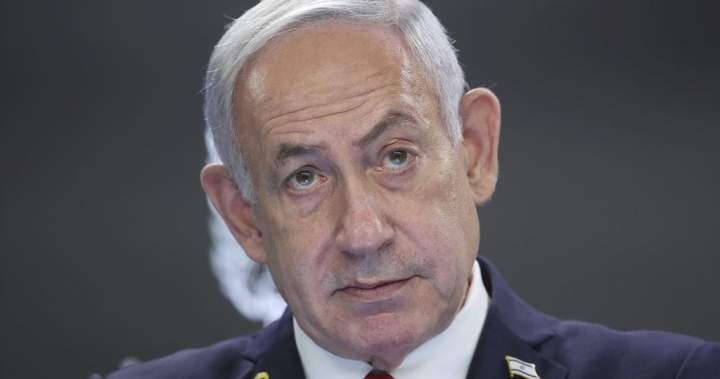Israeli Prime Minister Benjamin Netanyahu said on Tuesday that he had ordered the army to immediately carry out “serious attacks”. Gazaand Hamas responded by saying it would delay the handover of a hostage’s body, putting new pressure on the tenuous U.S.-brokered ceasefire.
Associated Press reporters and witnesses heard tank fire and saw explosions in various parts of the Gaza Strip, including Gaza City and Deir al-Balah.
The order for the attacks came, according to an Israeli official Hamas had fired on his forces in southern Gaza and after the Palestinian militant group handed over body parts on Monday Israel These were the partial remains of a hostage that had been recovered earlier in the war.
Netanyahu called the return of those body parts a “clear violation” of the ceasefire agreement, which requires Hamas to return the remaining hostages in Gaza as quickly as possible.
Israeli Defense Minister Israel Katz said in a statement that Hamas would pay a “heavy price for attacking Israeli soldiers in Gaza and for violating the agreement to repatriate the deceased hostages.” Israel notified the United States on Tuesday before the attacks began, according to two U.S. officials who spoke on condition of anonymity to discuss sensitive matters.
An AP reporter in the central Gaza town of Deir al-Balah heard tank shots coming from an area controlled by the Israeli army. And in Gaza City, two health officials reported strikes, including near Shifa Hospital.
Earlier in the day, Israeli troops came under fire in the southern city of Rafah and returned fire, according to an Israeli military official who spoke on condition of anonymity because there was no official announcement. In a statement, Hamas denied involvement in the shooting in Rafah and reiterated its commitment to the ceasefire.

Get national news daily
Receive the most important news as well as headlines from politics, business and current affairs in your inbox once a day.
“Israel’s violent attacks across the Gaza Strip represent a blatant violation of the ceasefire agreement,” the group said, calling on mediators and guarantors to immediately pressure Israel to stop its escalations against civilians and abide by the ceasefire agreement
Vice President JD Vance expressed confidence that the ceasefire would hold. “That doesn’t mean there won’t be little skirmishes here and there,” Vance told reporters on Capitol Hill.
The fragile ceasefire has so far held despite tests
The ceasefire, which began on October 10, has largely been held despite at least two previous outbreaks of violence.
On October 19, Israel said two Israeli soldiers had been killed by Hamas fire. According to local health authorities, Israel responded with a series of attacks that killed over 40 Palestinians. And over the weekend, Israel carried out an airstrike against what it said were Islamic Jihad militants planning an attack, injuring several people.
There are still 13 bodies of hostages in Gaza. Hamas said on Tuesday it had recovered the body of a hostage, but after Israel announced plans to attack Gaza, Hamas said in a statement it would delay the handover.

An Associated Press videographer in Khan Younis on Tuesday witnessed several men, including some masked militants, carrying what appeared to be a white body bag out of a tunnel and then transporting it into an ambulance. It wasn’t immediately clear what was in the bag.
The slow return of the hostage bodies poses a challenge to implementing the next phases of the ceasefire, which will address even more difficult issues such as disarming Hamas, stationing an international security force in Gaza and deciding who will govern the territory.
Hamas said it was struggling to find the bodies amid huge destruction in Gaza, while Israel accused the militant group of deliberately delaying their return.
Over the weekend, Egypt deployed a team of experts and heavy equipment to help search for the bodies of the remaining hostages. This work continued on Tuesday in Khan Younis and Nuseirat.
An Arab official involved in the ceasefire negotiations between Israel and Hamas said talks were underway with both sides to prevent the ceasefire from collapsing. “Both sides violated the agreement, but there was no material breach,” said the official, who spoke on condition of anonymity due to the sensitivity of the matter.
The official said the violations included delays in handing over bodies, failure to open the Rafah border crossing between Gaza and Egypt, delays in evacuating patients from Gaza, limited expansion of aid deliveries and “minor skirmishes” on the line separating Israeli troops from the rest of the Gaza Strip.
The remains returned overnight were identified as belonging to Ofir Tzarfati, Netanyahu’s office said.
Tzarfati was kidnapped from the Nova music festival on October 7, 2023, during the Hamas-led attack on Israel that sparked the war. In total, the militants killed about 1,200 people that day, mostly civilians, and took 251 hostages.
Tzarfati was killed in captivity and his body was recovered by Israeli troops in November 2023. In March 2024, his family received additional remains for burial.

Tzarfati’s family said in a statement that this was the third time “we have been forced to open Ofir’s grave and rebury our son.”
This is the second time since the ceasefire that the remnants of Hamas have been problematic. Israel said one of the bodies released by Hamas in the first week of the ceasefire belonged to an unidentified Palestinian.
During a previous ceasefire in February 2025, Hamas said it had handed over the bodies of three hostages, Shiri Bibas and her two sons, but investigations revealed that one of the returned bodies was a Palestinian woman. A day later, Shiri Bibas’ body was returned.
In return for 15 dead hostages returned from Gaza since the ceasefire began, Israel has returned 195 Palestinian bodies to Gaza. The last 20 living hostages were returned to Israel at the start of the ceasefire and in return Israel released approximately 2,000 Palestinian prisoners.
More than 68,500 Palestinians have died in Gaza’s two-year war, according to Gaza’s Health Ministry, which does not distinguish between civilians and combatants in its counts. The ministry maintains detailed accident records that are considered generally reliable by UN organizations and independent experts. Israel has denied them without specifying its own tribute.
Associated Press writers Josef Federman and Renata Brito in Jerusalem, Menelaos Hadjicostis in Nicosia, Cyprus, Samy Magdy in Cairo, Sam Mednick in Rome and Melanie Lidman in Tel Aviv, Israel, contributed to this report.







